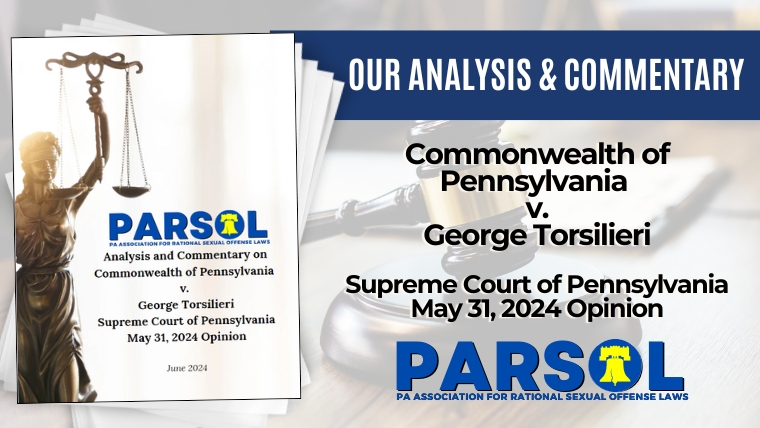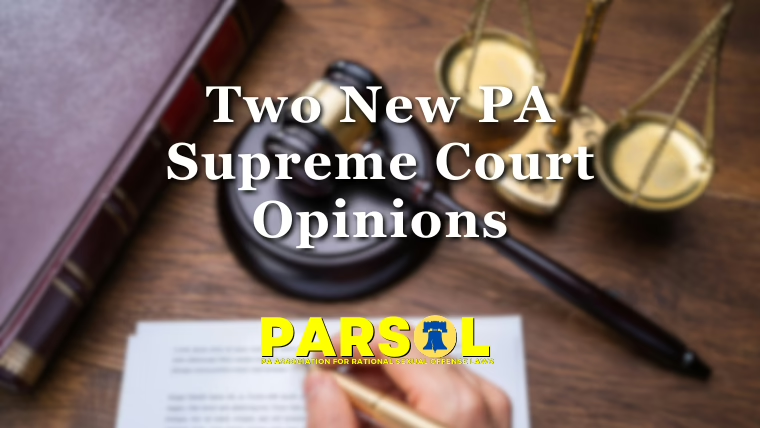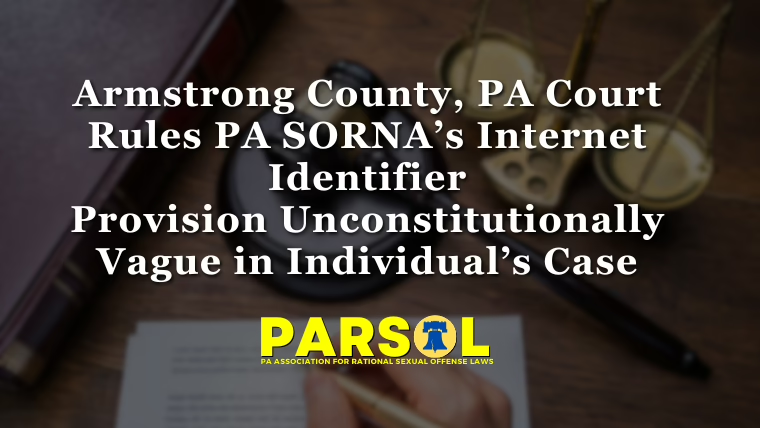Introduction
The long-awaited Commonwealth v. Torsilieri (Pa. 2024) (Torsilieri II) opinion finally dropped on May 31, 2024 – fifty-three weeks after the Supreme Court of Pennsylvania (SCOPA) heard oral arguments. What PARSOL hoped would be a ‘slam dunk’ win after the Chester County Court of Common Pleas decided twice in the defendant’s favor only became a huge disappointment. SCOPA, in a 4-2 decision, reversed the trial court order in its entirety.
Chief Justice Debra Todd wrote the majority opinion, joined by Justices Kevin Dougherty, Sallie Mundy, and Kevin Brobson. Justice Mundy also wrote a concurring opinion. Justice David Wecht wrote a concurring and dissenting opinion, and Justice Christine Donohue wrote a dissenting opinion.
Case History
George Torsilieri was convicted of aggravated indecent assault and indecent assault in 2015. His conviction categorized him as a Tier III registrant under Pennsylvania’s Sex Offender Registration and Notification Act (SORNA), imposing lifetime registration and listing his personal information on a public website.
The Pennsylvania General Assembly enacted 2018 Act 29, which amended SORNA to address constitutional issues raised in previous court cases. The amendments created two subchapters: Subchapter H, which applied to Persons Forced to Register (PFRs) who committed their crimes on or after December 20, 2012 (SORNA’s enactment date), and Subchapter I, which applied to PFRs whose offense was before that date. As Torsilieri’s offense occurred in 2015, he fell under Subchapter H. The General Assembly also changed SORNA’s provisions, allowing for reductions in registration requirements for certain PFRs who complied with registration for the first three years. They also provided a process for PFRs to petition for removal from the registry after 25 years.
In May 2018, Torsilieri filed a motion arguing that Subchapter H’s legislative finding that “sexual offenders pose a high risk of committing additional sexual offenses,” 42 Pa.C.S. § 9799.11(a)(4), violated his due process rights and was unconstitutional under Article 1, Section 1 of the Pennsylvania Constitution – Right to Reputation. Experts presented evidence and studies indicating that registration and notification provisions are based on false assumptions about recidivism rates.
In August 2018, the Chester County Court of Common Pleas (“the trial court”) declared Subchapter H unconstitutional, stating that it infringed on his due process rights and amounted to punishment. They also found that it violated separation of powers and constitutional prohibitions against cruel and unusual punishment. As a result, the trial court vacated his registration requirements. The Commonwealth appealed the decision to SCOPA.
In Commonwealth v. Torsilieri, 232 A.3d 567 (Pa. 2020) (Torsilieri I), SCOPA vacated the trial court’s order declaring the registration and notification requirements for PFRs unconstitutional. SCOPA recognized the deference to legislative determinations but noted that the court system’s responsibility is to protect constitutional rights if there is a consensus of scientific evidence against the legislative policy. However, the evidence presented by Torsilieri and the lack of evidence from the Commonwealth was insufficient to determine at that time, so they remanded the matter to Chester County as SCOPA does not hear new evidence.
Upon remand, the trial court conducted evidentiary hearings in June of 2021 with testimony presented by scholars, statisticians, and experts in evidence-based harm prevention, treatment of ‘sex offenders,’ and criminogenic sexual behavior. The trial court applied the three-prong test to determine the constitutionality of an irrebuttable presumption (assuming something is true without allowing contradictory evidence). Chester County Judge Allison Bell Royer found that the law’s presumption of high recidivism amongst all ‘sex offenders’ infringed on an individual’s right to reputation. Expert witnesses showed the presumption not to be universally true. The trial court also considered reasonable alternatives to the current registration and notification provisions.
The trial court concluded that the irrebuttable presumption violated Mr. Torsilieri’s right to reputation and found the lifetime registration and notification provisions unconstitutional.
The trial court also determined that Subchapter H is punitive (imposes punishment) based on the factors provided in Kennedy v. Mendoza-Martinez, 372 U.S. 144 (1963), therefore violating the separation of powers doctrine, the 8th Amendment prohibition on cruel and unusual punishment, and the right to a jury determination of facts. As a result, the trial court struck down Subchapter H as unconstitutional. Again, the Commonwealth appealed the decision to SCOPA. SCOPA heard oral arguments on May 23, 2023.
OUR ANALYSIS OF THREE FACTORS
The case of Torsilieri II underscores a significant judicial debate over the balance between legislative deference and the need for individualized assessments in the context of registration laws. The Majority views favoring legislative prerogatives and public safety considerations, while Justices Wecht and Donohue highlight ongoing concerns about fairness, due process, and the reliance on empirical evidence in shaping legal standards.
In our analysis, we examine the three primary factors examined in the Court’s opinions:
- deference to legislative findings;
- Irrebuttable Presumption Doctrine; and
- non-punitive nature of SORNA.
FACTOR 1: Deference to Legislative Findings
In the legal realm, giving deference to legislative findings means that courts show respect for and often accept the factual and policy determinations made by legislative bodies, such as Congress or state legislatures when evaluating the constitutionality or legality of legislation. This deference is based on recognizing that legislatures have the institutional competence and democratic legitimacy to make such determinations.
When courts review the constitutionality of a statute, they often start with a presumption that the legislature’s findings are correct. This means the burden is on the challenger to prove that the legislative findings are unreasonable or unsupported by evidence. Courts apply a rational basis review in cases where the legislation does not violate fundamental rights or involve suspect classifications. Under this standard, legislative findings will be upheld if any reasonably conceivable set of facts could provide a rational basis for the legislative decision.
Courts exercising judicial restraint often defer to legislative findings out of respect for the separation of powers. This principle acknowledges that legislatures, being directly accountable to the people, are better suited to make policy decisions. Legislatures can conduct extensive fact-finding through hearings, investigations, and expert testimony. Courts recognize that legislatures are better positioned to gather and assess the complex data and evidence necessary for certain policy decisions.
The level of deference can vary depending on the standard of review applied. For example:
- Strict Scrutiny: Courts apply strict scrutiny to laws affecting fundamental rights or involving suspect classifications and are less deferential to legislative findings.
- Intermediate Scrutiny: For laws involving quasi-suspect classifications, courts apply intermediate scrutiny, which involves moderate deference.
- Rational Basis Review: For most other legislation, courts apply rational basis review and are highly deferential to legislative findings.
Deference Application in Torsilieri II
The majority opinion emphasized the principle of judicial deference to legislative findings by quoting Parker v. Children’s Hospital of Philadelphia, 394 A.2d 932, 937 (Pa. 1978), noting, “the power of judicial review must not be used as a means by which the courts might substitute [their] judgment as to the public policy for that of the legislature.” Furthermore, they note, “Statutes creating irrebuttable presumptions are not per se violative of the constitution,” per Weinberger v. Salfi, 422 U.S. 749 (Pa. 1975). It continues by listing several examples of where such irrebuttable presumptions are used, like age classifications, such as minimum ages for various activities and mandatory retirement ages or appointment ineligibilities, and actions, such as prohibiting individuals convicted of certain offenses from owning or using firearms (Maj. Op., 23-25).
PARSOL’s Position on Deference
PARSOL knows comparing age classifications and prohibitions based on convictions with the presumption that all sexual offenders pose a high risk of reoffending is flawed. Minimum age requirements for various activities (like voting, driving, and drinking) and mandatory retirement ages are based on developmental psychology and social expectations. These rules ensure that individuals have the maturity, experience, and capacity to handle certain responsibilities or roles effectively and safely. Restrictions on firearm possession for those convicted of specific offenses are grounded in public safety concerns and clear statistical evidence that suggests a higher likelihood of future violence or unlawful behavior among narrowly tailored offenses.
The Pennsylvania General Assembly’s legislative findings regarding SORNA are not narrowly tailored, as shown by the fact that someone can be placed on the registry for a non-sexual offense like unlawful restraint, false imprisonment, interference with custody of children, luring a child into a motor vehicle, and kidnapping, 42 Pa.C.S. § 9799.14 (b) and (d).
Furthermore, effective management and prevention of sexual offenses often require individualized assessments rather than broad presumptions. Tailored interventions based on specific risk factors and circumstances are more effective than blanket policies (Donohue Dissent, 25-26). Therefore, while generalizable data and practical considerations support age-based classifications and prohibitions based on certain convictions, the assumption that all persons who commit crimes of a sexual nature are high-risk is overly simplistic and not sufficiently supported by nuanced evidence, as Justice Donohue argued throughout her Dissent.
FACTOR 2: Irrebuttable Presumption Doctrine
The Irrebuttable Presumption Doctrine is a legal principle that deals with the constitutionality of certain types of presumptions used in law. An irrebuttable presumption is a legal presumption that cannot be contested or disproven by evidence to the contrary. Once a particular fact is established and the law presumes said fact to be true, this presumption cannot be challenged, regardless of actual circumstances.
The Irrebuttable Presumption Doctrine primarily arises in the context of constitutional law. The U.S. Supreme Court has scrutinized these presumptions under the Due Process Clause of the Fourteenth Amendment. The concern is that irrebuttable presumptions can violate due process rights by denying individuals a fair opportunity to present evidence and challenge the presumption.
Laws creating irrebuttable presumptions must be carefully scrutinized to ensure they do not deprive individuals of fundamental fairness and due process. Suppose an individual believes the presumption infringes on their constitutional rights. In that case, the individual should have the opportunity to present evidence and argue against the presumption, ensuring that decisions are based on the facts of each case rather than inflexible rules. While the government can create presumptions to streamline administrative processes, these presumptions must be reasonable and not arbitrary. There must be a logical connection between the fact established and the presumption it leads to.
The Irrebuttable Presumption Doctrine does not mean that all presumptions are unconstitutional. Rebuttable presumptions, which allow for the possibility of presenting contrary evidence, are generally permissible. The doctrine explicitly targets absolute presumptions that deny any opportunity for rebuttal, potentially violating due process rights.
Whether an irrebuttable presumption is constitutional involves a three-part test. An irrebuttable presumption is unconstitutional when:
- it infringes on an interest protected by the due process clause;
- the presumption is not universally true;
- Reasonable alternative means exist to ascertain the presumed fact.
Application to Torsilieri II of the Irrebuttable Presumption Doctrine
The majority opinion held the General Assembly’s presumption that persons forced to register pose a high risk of reoffending should not be overturned as they believe Mr. Torsilieri did not meet the burden of establishing a clear consensus of contrary scientific evidence. They referred to the Cambridge Dictionary, Dictionary.com, and The Britannica Dictionary to define “consensus” to understand the test’s second prong. They concluded, “a ‘consensus’ is a generally accepted opinion or general agreement regarding a proposition.” Instead of analyzing the actual statutory legislative finding, they reframed the question as “whether sexual offenders are more likely to commit additional sexual crimes than non-sex offenders,” (p. 35-36).
They heavily relied on the experts conceding the statistic that “adult sexual offenders re-offend at a rate of at least three times higher than other individuals convicted of non-sexual offenses,” (Maj. Op., 37). Justice Donohue called this statistic the “aggregate recidivism rate” (Donohue Dissent, 1). She makes the connection between the reframed question and the use of the aggregate recidivism rate, “the Majority decision rests entirely on the aggregate recidivism rate of sex offenders to defeat the assertion that SORNA’s irrebuttable presumption is not universally true,” (ibid, 7). She rebuts the Majority with, “a small subset of sex offenders accounts for a shockingly disproportionate amount of sex offender recidivism that is reflected in the aggregate recidivism rate,” (ibid, 21).
PARSOL’s Position on the Irrebuttable Presumption Doctrine and Torsilieri II
SCOPA has now created a train wreck. What does this mean for the Irrebuttable Presumption Doctrine? Was it misconstrued or possibly sabotaged in efforts not to address the heart of the issue, keep SORNA alive, and silently decommission the doctrine? If that is the case, the Court should plainly state that the doctrine is no longer useful for x reasons. Justice Wecht wrote, “This Court insists on pretending it remains alive. The time has come to bury it,” (Wecht’s Con. & Diss. Op., 21). He believes parties should utilize the Equal Protection Clause instead. See Wecht’s Con. & Diss. Op. at 14, 16, and 20. Justice Donohue, however, believes the doctrine should be preserved as “a rare but vital check on legislative overreach” (Donohue Dissent, 6). Justice Donohue’s view makes the most logical sense as having three branches of government means checking and balancing each other.
Will the Irrebuttable Presumption Doctrine remain a check-and-balance tool within the Pennsylvania Courts? After this, the probability is unlikely.
FACTOR 3: Non-punitive Nature of SORNA
The Mendoza-Martinez factors are a set of criteria courts use to determine whether a law or governmental action constitutes punishment. These factors originated from the Supreme Court case Kennedy v. Mendoza-Martinez (1963).
The Mendoza-Martinez Factors
- Whether the sanction involves an affirmative disability or restraint.
- Whether it has historically been regarded as a punishment.
- Whether it comes into play only on a finding of scienter (knowledge of wrongdoing).
- Whether its operation will promote the traditional aims of punishment – retribution and deterrence.
- Whether the behavior to which it applies is already a crime.
- Whether an alternative purpose to which it may rationally be connected is assignable for it.
- Whether it appears excessive in relation to the alternative purpose assigned.
Should the court agree that the registry is indeed punitive under the Mendoza-Martinez factors, whether or not a person is subject to registration would be subject to the following Constitutional provisions:
- determination by a trial court (jury trial), not automatically applied based on crime classification;
- protections against cruel and unusual punishment; and
- separation of powers doctrine which states that a legislative or governmental action cannot impose sanctions or punishment reserved for the judicial branch.
Application to Torsilieri II
In the Torsilieri II case, SCOPA ruled that the registration and notification requirements of SORNA are not punitive, stating they do not constitute criminal punishment but are instead civil regulatory measures intended to protect the public. They applied the Mendoza-Martinez factors to SORNA’s Subchapter H for Tier III registrants to draw this conclusion. The Majority found it was only necessary to analyze five of the seven factors as factors three and five bore little importance to their inquiry.
While the majority heavily relies on the legislative intent and procedural safeguards added to mitigate the punitive aspects, Justice Wecht’s dissent focuses on the requirements’ practical implications and cumulative burdens. It argues that they impose significant restraints and align with traditional punishments, thus having a punitive effect. This reflects a broader judicial debate on balancing legislative intent with the real-world impact of statutory requirements on affected individuals.
The majority and Justice Wecht differed on how factors 1 and 7 should be weighed. Justice Mundy concurred with the Majority only, except for factor two. Justice Donohue joined Justice Wecht, adding expanded thoughts on Mendoza-Martinez factor 1 (whether the sanction involves an affirmative disability or restraint).
Factor 1 asks if the sanction involves an affirmative disability or restraint. The majority believes the reduced frequency of in-person registration requirements is not sufficiently burdensome (Maj. Op., 42-45). However, Justice Wecht’s dissent asserts that the mere legislative command to appear and report in person to the Pennsylvania State Police suffices to establish ‘affirmative disability or restraint.’ Justice Wecht also criticizes the majority for turning their analysis into a counting exercise, emphasizing that factor 1 does not ask for a degree of severity but rather whether the statute imposes any disability or restraint, a simple yes or no question (Wecht’s Con. & Diss. Op., 32-35). As Justice Wecht explains, the majority has continued an issue they created in Commonwealth v. Lacombe, 234 A.3d at 619-20 (Pa. 2020), “there was a point at which a requirement for in-person visits comes to constitute an affirmative disability or restraint. We still do not know where that line is… today’s Majority declines to reveal where that line is or how to find it. We simply must take the Majority’s word for the proposition that thirty-four [visits] does not rise above its hidden line in the sand” (Wecht’s Con. & Diss. Op., 32, 33).
Factor 7 asks if the sanction appears excessive in relation to the alternative purpose assigned. The majority holds that Subchapter H is not excessive in protecting the public by informing them about individuals forced to register. The statute aims to prevent offenses by notifying the public and enabling them to take precautions. It rejects the argument that it lacks individualized assessments and views the classification system as a rational policy decision (Maj. Op., 51-54). Justice Wecht’s dissent strongly disagrees with the majority’s assessment, stating that Subchapter H is excessive and burdensome. He argues that the requirements, such as lifetime registration and in-person reporting, do not clearly benefit public safety. Furthermore, he criticizes the lack of individualized risk assessments and believes that the one-size-fits-all approach leads to disproportionate punishment. He believes this undermines the intended non-punitive goals of public protection and information (Wecht’s Con. & Diss. Op., 40-42).
PARSOL’s Position on the Punitive or Non-Punitive Nature of SORNA
PARSOL and anyone affected by the public registry know that being on the registry is punitive. We know that the registry is ongoing punishment, extending long after an individual has ‘done their time’ in prison, on parole, and on probation. While the majority focused on the law’s intent, we know that, as the minority stated, the actual practical implications of the registry are indeed punitive.
Conclusion
The Supreme Court of Pennsylvania’s May 31, 2024 ruling concludes that SORNA’s Subchapter H is non-punitive and maintains its status as a civil regulatory scheme rather than criminal punishment. Since the statute is not considered punitive, it is less vulnerable to challenges based on claims of cruel and unusual punishment, ex post facto violations, or other constitutional grounds that hinge on a statute being punitive. Overall, the Majority solidifies Subchapter H’s standing as a regulatory measure focused on public safety rather than punishment, setting a challenging precedent for future legal disputes against the statute.
Now what?
Future challengers must meet a high burden of proof to demonstrate that the statute’s effects are so punitive they override the legislature’s non-punitive intent. Derivative constitutional claims related to punitive measures, such as those concerning the separation of powers or the right to a jury trial, are likely to fail unless it can be clearly shown that the statute constitutes criminal punishment.
PARSOL’s Overall Position
SCOPA says SORNA, regardless of how many times someone must register and update, the burden of traveling to a registration site miles out of the way, the implication of failing to register, and the alienation from society it causes is not punishment. Still, PARSOL knows SORNA is a punishment from a real-world practical standpoint. This setback doesn’t signify defeat. It only pushes us to be more determined than ever to see that individuals on the registry are given an equal shot at re-entry like everyone else. We are even more determined to help persons forced to register to receive relief from the registry.
Disclaimer and Terms of Use
PARSOL provides this analysis and commentary as legal information, and PARSOL publications shall not be construed as legal advice. For legal advice, contact a registered attorney, such as members of the Pennsylvania Criminal Defense Lawyers (PACDL.org) or the Defenders Association of Philadelphia (PhillyDefenders.org).
Acknowledgements & Author Statement
Lead Author: Josiah Krammes, AAS
Editor: John Dawe, MNA, CNP, RCP, RCPF
Contributors: Robert A. Cicchinelli, MS; Randall Hayes; Brian Taussig-Lux; and the PARSOL Legal Information Committee
PARSOL wishes to express our gratitude to Attorneys Aaron Marcus, Marni Jo Snyder, other members of the legal team, and, of course, Mr. George Torsilieri for fighting for fair and just rational sexual offense laws on behalf of tens of thousands of Pennsylvanians directly and indirectly affected by Pennsylvania Megan’s Law/SORNA. We also thank Justice Donohue for seeing the registry for what it really is and standing up for what is right, as well as Justice Wecht for weighing SORNA in light of the requirements’ practical implications and cumulative burdens.




